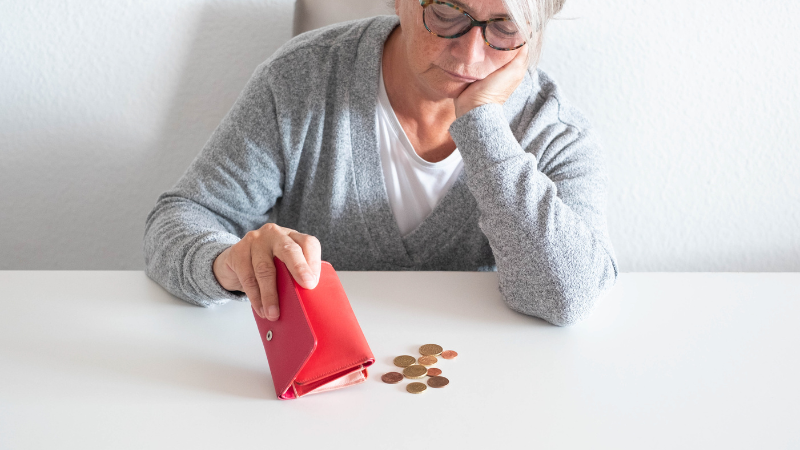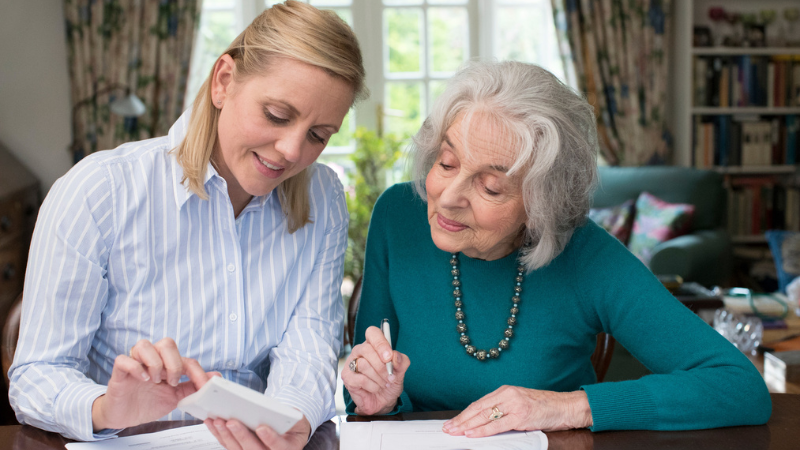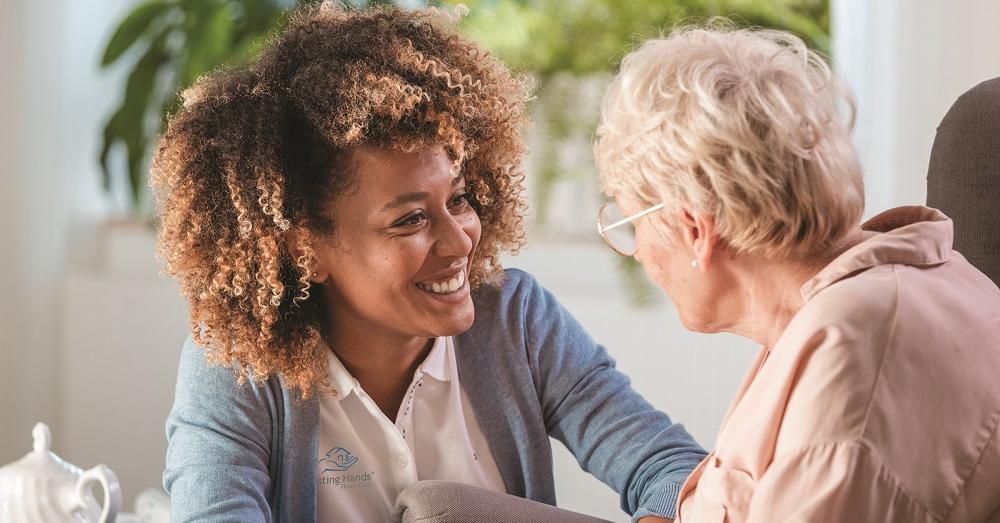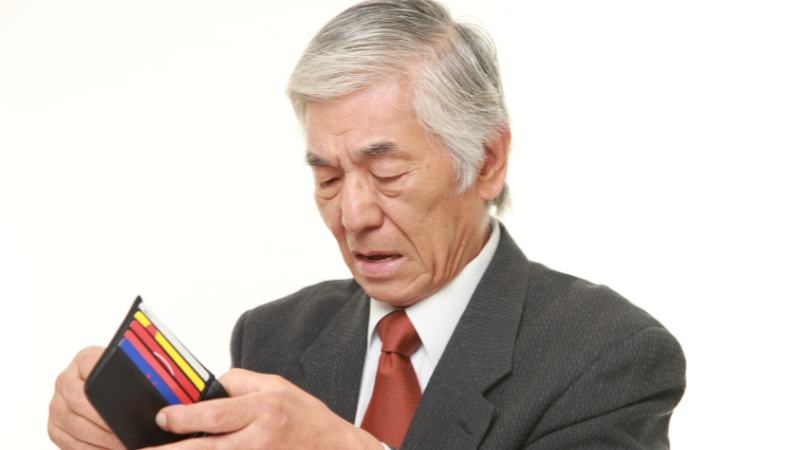

The aging process can be challenging, even with the support of family and sufficient financial resources. While some seniors have preserved a nest egg after years of working and saving, others are burdened by meager assets, creating significant financial strain. For aging adults with little to no money, accessing basic needs such as home care services, housing, and daily assistance becomes difficult.
However, family members can play an essential role in supporting their senior parents in various ways. This article discusses what happens to older adults who have little to no money as well as resources and tips for seniors. These combined efforts can help ease the burden on aging parents and help them navigate this stage with strength.
How common is poverty among the elderly?
According to the US Census Bureau data, poverty has continuously increased among the older population for the last three years. In aging adults 65 years and older, the poverty rate jumped from 10.9% in 2022 to 11.3% in 2023. These percentages mean that one million more seniors rely on scarce resources to survive.
In total, six million aging adults live below the poverty level. Despite Social Security and Medicare, a concerning number of older people live with limited financial means. These government programs are not sufficient enough to lift seniors out of poverty.
Elderly women who live alone suffer slightly harsher circumstances than aging men. About 54 percent of older women who live alone are considered poor according to federal poverty standards or are unable to bring in enough income to pay for daily essentials. About 45 percent of men experience the same.
What are the costs associated with growing older?

The cost of aging is high. Seniors must pay for health care, transportation, housing, food, and miscellaneous expenses. As inflation soars, expenses for elderly individuals increase. Seniors struggle upon losing jobs, as many did during the second and third years of the pandemic.
An older person who lives alone must bring in $1,873 per month if they do not have a mortgage and $2,256 if they rent a home. A senior with a mortgage and who lives alone must come up with $2,842 per month in order to cover their expenses in 2021.
In a household of two elderly individuals without a mortgage, their monthly income should be $2,838. Aging couples who rent must have $3,223 in income per month. Senior couples without a mortgage will make ends meet with $3,087 per month.
Social security benefits pay a fraction of what a senior requires to cover basic living expenses. For a senior who lives alone and is in good health, Social Security covers 68 percent of basic living expenses; the percentage increases to 81 percent for an elderly couple in the same situation.
If seniors struggle with chronic illness or suddenly become ill, their medical expenses could quickly reduce their financial savings. In addition to becoming ill, many aging people worry that they will be unable to afford to live in their own homes.
Do government programs offer financial support?
Fortunately, need-based government programs, like Medicare and Medicaid, can be helpful financial resources for seniors who develop medical issues. Medicare covers many medical expenses for individuals over the age of 65, and Medicaid can provide coverage for eligible low-income seniors.
Aging adults without money to support them through the rest of their lives can stay in a nursing home for up to 100 days—and Medicaid will cover the cost for this brief period. Seniors who reside in an assisted living facility and run out of funds will be evicted.
Elderly individuals who are unable to turn to family for financial support and have no money can become a ward of the state. This may be the case if the senior develops a health emergency and is no longer able to live alone.
In the event a senior becomes a ward of the state, a guardian—someone the aging adult does not know—will be appointed to help make decisions about his or her living situation. However, becoming a ward of the state is far from ideal and should be a last resort.
How can seniors improve their financial security?

Financial concerns plague many seniors. But starting conversations early on with your aging parent can help the elderly plan for the future. Funds directly provided by the family are an option when seniors are ineligible for state and federal programs, or these resources are inadequate.
Family contributions to senior care
Seniors and their family members might consider combining resources and sharing the burden of care tasks. Such a solution can be effective for the long-run and meet the needs of the senior without overtaxing the family’s financial resources and reducing their willingness to help.
Seniors returning to work
Aging adults without the benefit of family support might consider returning to work. Studies show that people over 55 are the most successful at gig work, with one-third of gig workers being retirees. Seniors with the right skills can take advantage of the gig economy and find lucrative opportunities.
Cashing out or selling life insurance for senior care
Cashing out or selling life insurance policies are additional ways for seniors to pay for life essentials. Alternately, insurance conversion converts a life insurance policy to a long-term care payment plan. Reverse mortgages are an option for seniors who own their home.
Seniors who bring in a monthly income have the ability to pay for various expenses, from food and housing to home care, that enhance their quality of life. Assisting Hands Home Care services help seniors with not only completing daily tasks but also finding local resources that cater to the elderly.
We can point seniors to their local Area Agency on Aging for assistance with essential services. Our caregivers also provide direct support to older adults in the comfort of their homes. Professionals from our home care agency are an invaluable resource to keep seniors physically and emotionally healthy.
What is the average cost of home care services?
For seniors with limited financial resources, affording long-term care can be a significant challenge. Home care services provide seniors and individuals with disabilities the support and assistance they need to live safely at home. Compared to assisted living or nursing homes, home care is often the preferred option for those who prefer to remain in a familiar environment while receiving personalized care.
According to the Genworth Cost of Care Survey in 2023, the national average cost for home care services is $30 per hour. This means that families can expect to pay around $2,400 per month for part-time services, while full-time care may cost around $4,800 per month. Home care offers a cost-effective solution while ensuring that seniors receive one-on-one attention tailored to their unique needs.
What should seniors do if they cannot afford long-term care?
Despite being more affordable than institutional care, many seniors still struggle to cover home care expenses out-of-pocket. However, financial assistance options exist to help cover the cost of home care services. Medicaid may cover home care costs for low-income seniors, while Veterans Affairs (VA) benefits can provide aid to eligible seniors. Additionally, many states offer home and community-based services (HCBS) waivers to help seniors receive care at home rather than a facility. If seniors are unable to afford long-term care, there are several options available to ensure they receive the necessary support.
1. Medicaid Coverage
Many seniors may qualify for Medicaid, which provides coverage for long-term care services such as nursing home care and in-home care services. Since Medicaid is a joint federal and state program, eligibility requirements, benefits, and application procedures vary by state. Seniors and their families should carefully review their state’s Medicaid guidelines to determine eligibility and the types of services that can be covered. Consulting a Medicaid planner or elder law attorney can help seniors and their families navigate the process.
2. Community-Based Services
Various services are offered by programs such as Area Agencies on Aging to support seniors in their homes, including meal delivery, personal care assistance, and transportation services. These programs are funded by the Older Americans Act to help seniors age in place. In addition to assistance with daily living activities, these services may include wellness checks and home modifications.
3. Assisted Living and Adult Day Care
Assisted living services and adult day care centers can be more affordable options than nursing homes. Many states offer Medicaid waivers and financial aid to help cover costs. Assisted living provides meals, housing, and daily assistance, while adult day care offers supervised care and social activities.
4. Veterans (VA) Benefits
Seniors who are veterans or spouses of veterans may qualify for benefits through the Department of Affairs (VA). Aid and Attendance programs help with assisted living, nursing home care, and VA home care. Veterans may also access pensions, health care benefits, and home modification grants. To begin and navigate the application process, veterans are suggested to consult a Veterans Service Officer.
5. Financial Assistance Programs
Nonprofits and community organizations offer financial aid for seniors struggling with long-term care costs. Programs like BenefitsCheckUp and Supplemental Security Income (SSI) provide financial relief. Researching local resources and reaching out to organizations can provide valuable support for seniors who are struggling financially.
6. Reverse Mortgages
Homeowners can use a reverse mortgage to convert home equity into cash for home care expenses. This option allows seniors to stay in their homes without monthly payments, with repayment due when the home is sold. Consulting a financial advisor provides seniors and their families with a full understanding of the benefits and potential drawbacks. Seniors who own their homes can consider a reverse mortgage, which allows them to turn some of their home equity into cash to help pay for home care services.
7. Government and State Programs
In addition to Medicaid, many states have specific programs for senior care assistance, including tax relief, utility aid, and prescription discounts. Programs such as PACE and Community First Choice provide medical and support services. Researching state-specific resources can provide additional support for seniors and their families.
Does Medicare Pay for Home Care Services?
Medicare Advantage (Part C) plans often provide additional coverage beyond what traditional Medicare offers, which can include assistance with Activities of Daily Living (ADLs), homemaker services, and companion care provided by Assisting Hands Home Care. These sometimes limited and short-term benefits offer paid services and are designed to help seniors maintain independence and remain in their homes as long as possible. Coverage and availability can vary depending on the specific plan and provider.
- Assisting Hands ADL Care: Assisting Hands ADL care involves helping seniors with basic self-care tasks, which are critical for maintaining daily independence. Medicare Advantage plans (Part C) may cover bathing, personal hygiene, dressing, grooming, eating assistance, mobility support, and incontinence care.
- Assisting Hands Homemaker Care: Assisting Hands Homemaker services, while not medical, help seniors manage daily household tasks. Medicare Advantage plans might cover meal preparation, light housekeeping, grocery shopping, and linen changes.
For more information about what home care services are covered by Medicare and/or Medicaid, give Assisting Hands Home Care in Sarasota, FL a call.

Senior Home Care Services Provided by Assisting Hands
Assisting Hands Home Care professionals assist with personal hygiene tasks, perform light housekeeping, shop for groceries, prepare nutritious meals, give medication reminders, assess the home for fall risks, and offer safe transportation with senior home care services. Our compassionate companion care services keep loneliness and isolation at bay.
Elder care from our reputable agency is convenient, affordable, and flexible. Families and their aging loved ones are reassured by the dependability of our professionals and the quality of care we provide. Call our Sarasota, Florida, location to schedule an in-home consultation and start senior home care today at (813) 868-6782.

